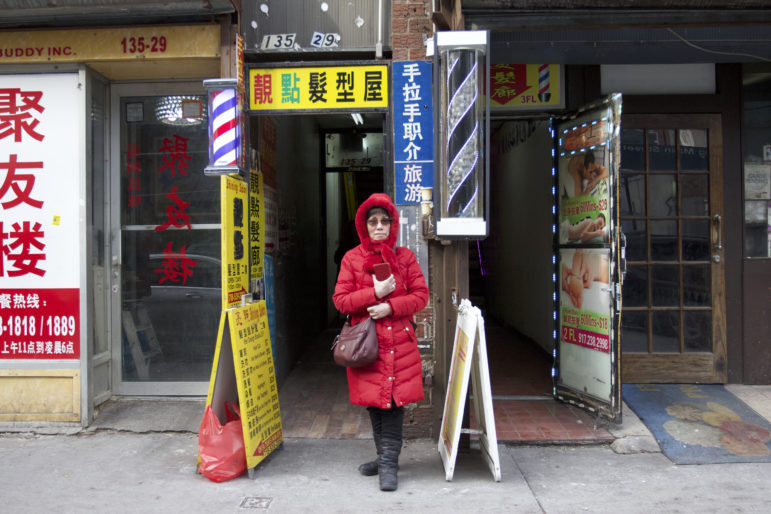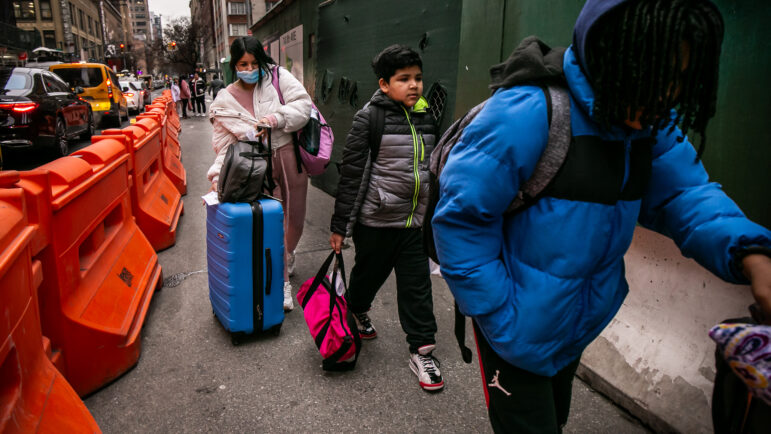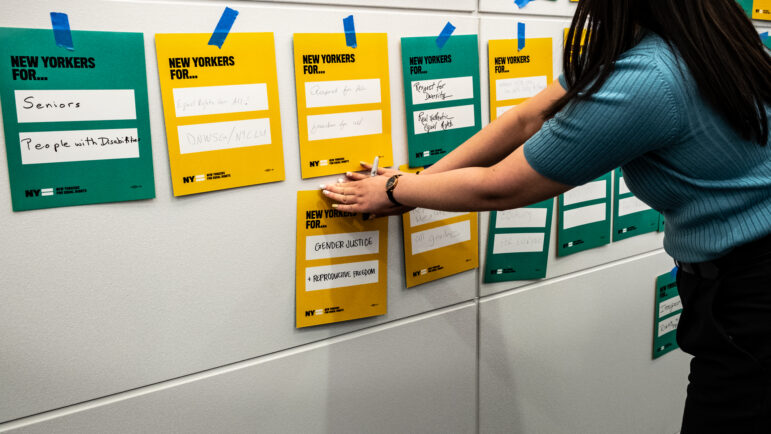
Theodora Yu
Madam Lee
In New York City’s hidden alleys and narrow corridors lay offices of matchmakers who weave the red thread of fate between couples.
“Are you looking for a U.S. citizen? We have many candidates,” Ying Chen told a visitor at her office on 40th Road in Flushing, New York. A matchmaker from Taiwan, who goes by “Mrs. Lee” or “Madam Lee,” Lee always begins conversations with this question to potential clients.
Around a thousand Chinese men and women have approached Lee since her matchmaking business started in 1980. Lee’s clients brought cash, photographs of themselves, and a list of criteria for their future husband or wife to her office. American citizens or green-card holders were often the most popular candidates and the fastest to get paired up.
Matchmaking has been an ingrained cultural practice in China since the Zhou Dynasty 2,000 years ago. But whereas historically, marriages were not considered valid if the couple did not get approval from their parents and trustworthy matchmakers, parties in a modern-day arranged meeting are free to decide if they are interested in their match, and would therefore like to build a relationship together.
Lee seems to have almost memorized the profiles of her dozens of clients. She can flip through her files of all Chinese, mostly 30 to 45 year olds, listing off their citizenship status, age, education background, height, and interest. Many are undocumented.
A parent dropped by Lee’s for updates on suitable partners for her daughter. “This client is a U.S. citizen who graduated with two master degrees from New York University,” said Lee, pointing at a photo of a man in his early thirties, smiling.
In light of tightened immigration policies under the Trump administration, meeting and marrying someone through Chinese matchmaking could be the solution for undocumented immigrants to stay in the U.S. But business has plummeted since 2016, said Lee, who said that people are now more wary because they believe the new administration will be stricter about determining whether a marriage is valid or not.
And some might say having a preference for green card holders or U.S. citizens is not a relationship purely about love.
But who is to say what love is?
On a crisp Sunday morning in summer last year, Zhu Yin, a 32-year old woman, had four missed calls from Lee. Dialing back, she heard Lee’s voice throbbing with excitement over the end of the line. (Pseudonyms are used to protect the identities of undocumented immigrants and Lee’s clients.)
Speaking rapidly, Lee informed Zhu that she had found a match for her. She had sent Zhu’s photo via WeChat to one of her clients, Mr. Gao, and he and his mother had expressed their interest to meet Zhu in person.
Zhu remembers what she wore that day – a yellow-grey striped pullover sweater, denim jeans, sneakers and a thin eyeliner – basically her everyday outfit. She wanted Mr. Gao to see who she truly was.
“It was not a love at first sight,” Zhu confessed, recalling her first meeting with Gao at Lee’s cramped office. “But it’s fine as long as I didn’t dislike him at first glance.” They exchanged numbers and began seeing each other regularly.
Zhu’s first impression of Gao was a hard-working man who respected his parents and knew how to cook – traits she appreciated in a potential future husband.
Gao is a U.S. citizen who runs his own business, which made him a reliable partner who could provide Zhu, who is undocumented and unemployed, with a secure life in United States.
When asked whether she preferred her future husband to be a U.S. citizen, Zhu said, “You know the answer.” She later broke up with Gao, however, because she felt that they are not compatible in terms of age and career direction.
Increasingly restricted immigration policies have “heightened fear” among the Chinese immigrant community, said Philip Kasinitz, a sociology professor at the Graduate Center of the City University of New York.
Without papers, unauthorized immigrants cannot get work permits, Kasinitz said. Although it’s easier for them to get away with working without a permit in places like Chinatown, the types of jobs available in the ethnic enclaves are limited and often fall below the expectations of college-educated immigrants.
“They can only do the lowest jobs, which most immigrants didn’t have in mind,” Kasinitz said. “They didn’t come for that and are stuck with an undesirable job.”
Meeting and marrying a U.S. citizen could be a solution for immigrants to build a life in the U.S., but that does not necessary mean the marriage between the couple is not genuine.
While Lee believes that a couple can happily marry for both love and a green card, the fact that the couple met via matchmaking could seem suspicious to officers at the United States Citizenship and Immigration Services. Many cases of fraudulent marriages, where it is solely a business transaction between two people to marry in exchange for status and money, have been reported by the local media over the years.
“Setting people up is okay,” said immigration lawyer Michael Wildes, but bringing in a preference that somebody has to have a U.S. passport “looks dodgy.”
Matchmaking businesses like Lee’s are legitimate, explained Wildes, because matchmakers are not introducing people for the express purpose of getting immigration benefits.
“The fact is, there are a lot of people who would love to be with Americans to stay in the U.S. not just to get immigration papers,” he pointed out.
Get the best of City Limits news in your inbox.
Select any of our free weekly newsletters and stay informed on the latest policy-focused, independent news.
A couple’s application for the undocumented party to adjust status and become a green-card holder now takes a longer time to process, said immigration attorney Changhee Nam. Officials ask more questions during interviews to decide whether a marriage is valid, fraudulent, or lacking enough evidence to prove its validity.
The burden of proof is on the applicant to “establish the validity of his or her marriage,” according to the U.S. Immigration and Citizenship Services policy manual for marriage and marital union for naturalization. Examples of evidence include photos, joint bank statements and joint mortgage to prove that the couple combine their finances and live together.
Because of the cultural gap between the East and West, Nam recommends to his clients that they should refrain from talking about how they met through a matchmaker.
“Matchmaking is a traditional part of our culture in Asia, but they don’t have this in the U.S. If you cannot explain what matchmaking is in detail, the authorities may not understand and view the marriage as a kind of immigration fraud,” Nam said. He emphasized that matchmaking is not illegal.
Elaine Qin, 31, has been living in New York for almost ten years. She is a green card holder and Lee’s client.
“I don’t mind sharing my resources with someone who truly likes me,” Qin said. “I won’t lose my green card when my husband adjusts his status, so why not? It won’t cost me anything.”
Qin has been set up with two different men in the past three months, but had been disappointed to find that her dates were more concerned with her financial background and citizenship status than her as a person.
“Over the course of years I’ve gained experience in dating and now I know better what kind of person fits me best,” Qin said. “My criteria is simple: I want a man who is sincere and honest, who won’t pick his wife like he is choosing a commercial product, and merely looks at her ‘benefits’,” she said.
Wilson Wang is a legal professional in his mid-thirties who currently holds temporary status in the United States. A friend referred Wang to Lee’s matchmaking business a year and a half ago.
“I don’t have the opportunity to meet women,” said Wang, explaining his decision to join the service. “Most of the people I meet in my network are men, and it has always been me alone in the office after I started my own business.”
Wang prefers Chinese matchmaking to dating apps. He hates the idea of marketing himself in his profile page with flattering descriptions and photographs, and he trusts Lee in introducing clients who are on the same page with him in terms of looking for a serious relationship.
“Also, why bother with apps when you can skip all the hustle of small chit-chat and directly get a phone number from Mrs. Lee?” he said, laughing.
Unlike some of Lee’s clients, however, Wang is open to dating women without a green card or citizenship status despite his visa status. “It is nice if the person I like has a green card, but it is not a must,” said Wang. “I guess it is an ego thing… I don’t want to beg for a green card and it is not my intention at all to defraud the system.”
The Chinese matchmaking business is a legitimate service that bridges people together, Wang believes.
“The legal standard of an authentic marriage is whether the couple shows a genuine intention to establish a life together,” he said. “A marriage is a contract between the couple vowing to support each other, and helping him or her get a green card is one of the many ways to do so. The problem is if you pay for it. Don’t pay for each other. Paying Mrs. Lee is fine because you pay for the service.”
Wang has gone out with four out of ten women whom Lee has introduced him to. His longest relationship only lasted for two months, however. He stopped seeing that match, who is a citizen, because he felt there were few common grounds of interests and beliefs between them.
Wang admitted that maybe part of the reason for his seeming pickiness is because he is a firm believer in true love.
“I feel apologetic to Mrs. Lee,” said Wang, noting how many women he’s already rejected from the matches he’s gotten from the service. “But I want to keep looking.”
So who is to say what is love? “Everyone’s definition is different, said Wang. “And I think everyone has a right to say what love is.”
Note: Lee’s office in Flushing is temporarily closed because she had a medical surgery, and her doctor has advised her to avoid climbing the stairs. She is currently running the business at home. The office will be reopened in March.









14 thoughts on “A Chinatown Matchmaker. An Immigration Crackdown. Who Decides What Love is?”
How can I contact Mrs. Lee? I would like to inquire about her services.
I am looking for a nice young lady to be my wife. I am a older hard working gentleman. I would like to contact Ms. Lee
I also am interested.
i am also trying to contact mrs lees services,please reply with informatioin
Would you please give me the information to contact. I’m looking to find a Chinese wife. My email is: dnamacy@yahoo.com. My name is Daniel. Thank you.
Please send me info
I’m an American woman (36) with high education. I’m looking for a Chinese husband that is kind hearted, loving and carrying. How can I contact a matchmaker?
May I have the information to contact. I’m looking to find a good hearted Chinese wife. I am from houston. My email is: muntasirfarid@yahoo.com. My name is John. Thank you
I am looking for Asian woman to marry me I am a US citizen white males 61 years old former US Marine retired disabled veteran
I am a 62 yr old DWM. I already know who I want to marry. Could I get information on how to contact Mrs. Lee or give her my contaction information for help with the process. Thank you!
I want contact information please for
Mrs.Lee, thank you.
Good Luck Marriage hotline in Flushing NY. Her name is Ying Chen Lee.
Im looking for an asian women whos looking for an american relationship
Im looking for info on finding asian women for relationship .do you have ying chen’s info